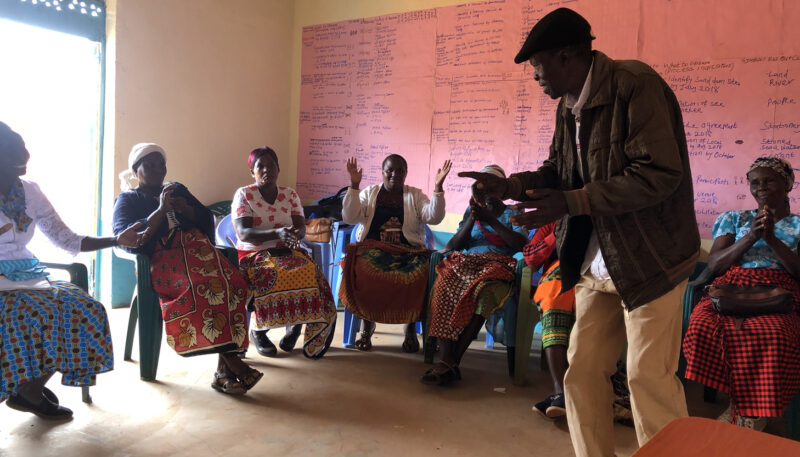ABM Archive Website
THIS WEBSITE CONTAINS ARCHIVE MATERIALS FOR HISTORICAL REFERENCE ONLY
For up-to-date information, including our latest appeals, news, and resources, please visit our current website.
Localising aid as the COVID-19 cloud engulfs the world

The faces of localisation: Benjamin Molimalawa, Chair of Kyumbuke Community Based Organisation addresses a meeting of local project participants in Kenya. © ABM.
As COVID-19 wrought havoc across the world, expat aid workers were on the move. Not flying into the developing world, but flying home.
Some aid experts view this mass evacuation as a harbinger for change in the way foreign aid is delivered. With fewer expat aid workers on the ground in developing countries, there is an opportunity for local agencies to claim, ‘greater ownership over humanitarian responses and development cooperation’, and for the aid industry to fund local actors to support locally led response. COVID-19 has the potential to boost ‘localisation’: local control over international aid.
That’s certainly a positive, but ABM has been using a strongly localised approach for decades. As a church agency, ABM has an approach that already devolves power and funding to our local partners in Africa, Asia and the Pacific. What makes us different?
- ABM is a non-implementing aid agency. The projects that we fund are designed and staffed by our local Anglican Church partners. In the 2016 ‘Grand Bargain’, many agencies agreed to ‘Achieve by 2020 a global, aggregated target of at least 25 per cent of humanitarian funding to local and national responders as directly as possible’. ABM has already far exceeded this 25% target, with more than 95% of our development and humanitarian funding being channelled through local partners.*
- Some aid agencies enter into short-term partnerships with local agencies, lasting just a few years or even less. ABM is an aid agency that commits to long-term partnerships. Some of our partnerships in the Pacific are more than 100 years old! ABM thus benefits from a deeper understanding of its local partners and a deeper relationship of trust than most other aid agencies.
- ABM’s local partners are church partners. That means they have strong grassroots networks and trust, have a long term commitment to the communities where they work, and have strong historical roots. In these respects, our partners differ from many NGOs and other newer local institutions. The grassroots networks mean our partners are well placed to bring community voices to decision-making forums. The long term commitment and strong historical roots give them a sense of legitimacy amongst those they represent and within decision-making fora.
Today, as COVID-19 threatens to destroy families and economies across the developing world, ABM’s partners are on the front line. They are providing water basins and soap at designated community meeting points in Kenya, using previously trained psycho-social counsellors to conduct COVID-19 awareness raising in Zambia, delivering soap, rice and sardines to households in the Philippines, installing water supply systems in PNG and Vanuatu, and bringing COVID-19 posters and personal protection equipment to communities in Myanmar.
ABM’s localised way of working has given our projects geographical reach and high levels of trust in even the most remote communities. And our way of working continues to deliver results to communities in the fight against COVID-19.
* Many ABM programs are partly funded by Australian Aid.
![]()


